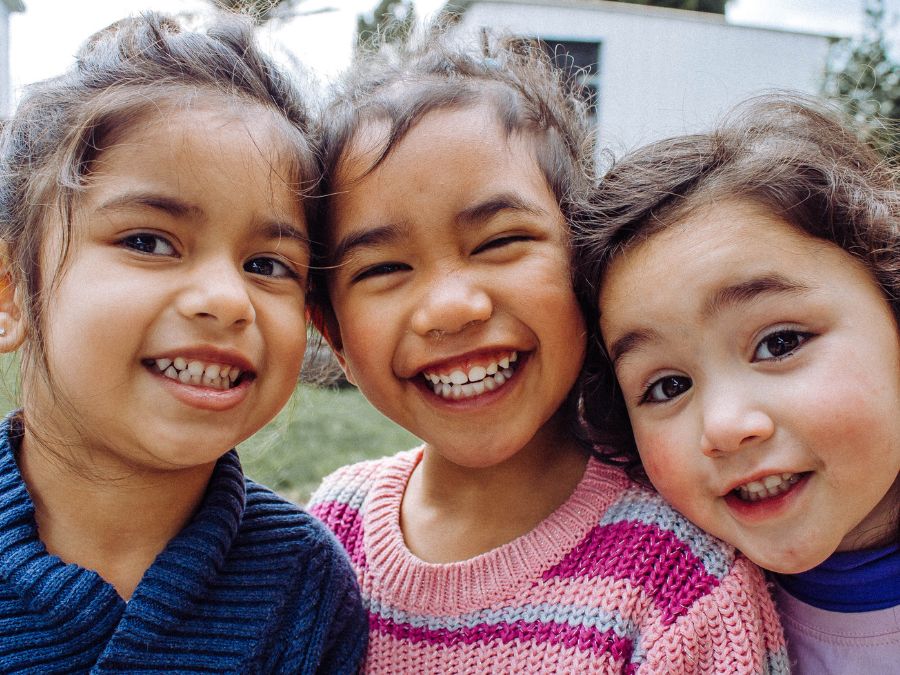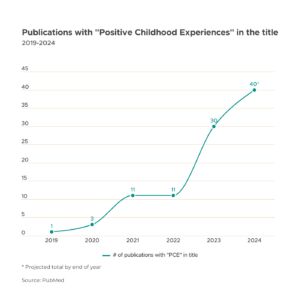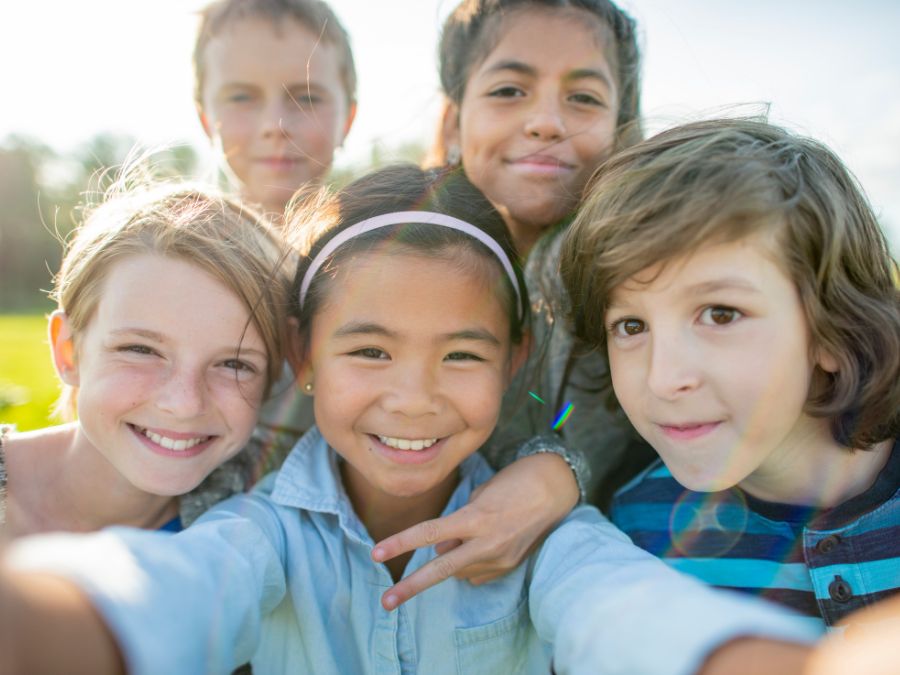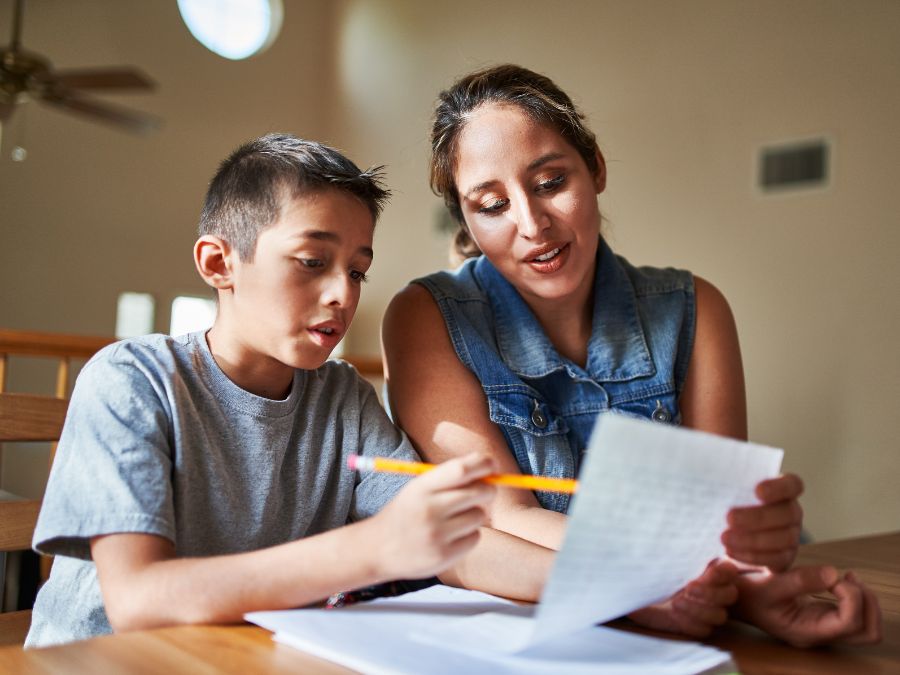
Emergence of positive childhood experiences as a research focus
In 2019, Christina Bethell, PhD, Robert Sege, MD, PhD, and colleagues published a study in JAMA Pediatrics where they discovered that positive childhood experiences (PCEs) buffer adults against the negative lifelong health effects caused by exposure to Adverse Childhood Experiences (ACEs). Shortly after, Dr. Sege founded the HOPE National Resource Center to create a movement that changes how people and organizations advance health and well-being for children, families, and communities through PCEs.

This influential publication led to the rapid expansion of research on PCEs across the United States and the world including studies conducted by the HOPE National Resource Center. Since 2020, over 70 publications studied PCEs and their effects on health.
Recent trends in PCEs research
This past year, we have observed four broad trends in PCEs research:
- Incorporation of PCEs into healthcare
- PCEs buffering the effects of ACEs
- College student mental health
- Adult outcomes
Shift towards strengths-based and trauma-informed care
Most publications on PCEs and healthcare focused on a shift to strengths-based and trauma-informed care. Healthcare professionals trained in trauma-informed care understand that their patients may have experienced past trauma that has led to negative health outcomes later in their lives. These professionals provide a space for their patients to heal so that they do not experience repeated trauma. Principals of trauma-informed care include safety, trustworthiness, choice, and shared-decision making.1
Several papers advocated for resilience and trauma-informed care to help children, families, and systems respond to trauma.2 In a study on early relational health care, Amanda Bell, MD and Richa Agnihotri, MBChB highlighted strategies that family physicians can use, including assessing and building on family strengths.3
PCEs help youth and adults heal
Several studies examined how PCEs buffer the harmful effects of ACEs. Researchers determined that PCEs help prevent some mental health conditions for youth even if they have been exposed to ACEs.4-6 This means that youth with higher levels of PCEs reported fewer mental health issues than their peers with lower levels of PCEs, even when they reported the same levels of ACEs. Isak Kim, PhD, in a study looking at looking substance use disorder, ACEs, and PCEs, found that greater levels of PCEs helped adolescents recover from their substance use disorder.7
Studies focused on adults showed similar beneficial effects of PCEs. According to a publication by Tam Nguyen, adults who have experienced emotional support as a child reported adjusting to a traumatic event better than those without emotional support as a child. This study demonstrated how one’s emotional support as a child determined how likely one would seek social support after a traumatic event as an adult.8
Effects of PCEs on college students
In a paper by Carl Hanson, PhD, PCEs showed an indirect effect on college students’ emotional and mental health by improving their cognitive and emotional coping abilities.9 Another study, by Paul Nestor, PhD, found that college students with higher levels of PCEs presented better psychological well-being and lower risks of developing psychological problems.10
PCEs lead to healthy living in adulthood
Finally, recent studies continue to demonstrate how PCEs lead to healthier outcomes later in adulthood. For example, Robert Whitaker, MD found that adults who had strong parental connections in childhood had higher flourishing and lower depressive symptoms in adulthood.11 In another paper by Dr. Mehmet Emin Şanli, higher levels of PCEs were associated with lower adult depression and anxiety among adults in Turkey.12
PCE research at the HOPE National Resource Center
The HOPE National Resource Center continues leading research on PCEs with two studies published in the past year. In a study examining adolescent students, Dina Burstein, MD, MPH, HOPE Project Director, and her team found that gender minority teens who reported more PCEs showed lower rates of substance use and depression.13
In our most recent publication in the CDC’s Morbidity and Mortality Weekly Report, Dr. Sege and colleagues conducted the largest PCEs study on adults. They found that most adults reported high levels of PCEs, but notable differences remained when comparing people’s race or ethnicity, sexual orientation, income, and education.14 We hope these findings inspire further research on PCEs and policy work that improves equitable access to PCEs for everyone.
Bringing research results into your work with children and families
How can you apply the research on PCEs in your work with children and families? Here are reflection questions to get you started:
- How does this research on PCEs relate to you? Reflect on how it impacts your professional work with children and families in your community. How does it personally impact you and your family?
- Why is it important to include PCEs in your work that already incorporates trauma-informed care and strengths-based practices?
- Knowing how PCEs help us heal from past trauma, how does this impact your interactions with children and families?
The HOPE National Resource Center also provides free resources to help you reflect and practice PCEs with children and families:
References:
- Goldstein E, Chokshi B, Melendez-Torres GJ, Rios A, Jelley M, Lewis-O’Connor A. Effectiveness of Trauma-Informed Care Implementation in Health Care Settings: Systematic Review of Reviews and Realist Synthesis. Perm J. Mar 15 2024;28(1):135-150. doi:10.7812/tpp/23.127
- Leitch L, McCaw B. Time to Move Forward: Resilience and Trauma-Informed Care. Perm J. Mar 15 2024;28(1):188-192. doi:10.7812/tpp/23.076
- Bell A, Agnihotri R. Early relational health care: What is known and what is new for family physicians. Can Fam Physician. May 2024;70(5):298-302. doi:10.46747/cfp.7005298
- Samji H, Long D, Herring J, Correia R, Maloney J. Positive childhood experiences serve as protective factors for mental health in pandemic-era youth with adverse childhood experiences. Child Abuse Negl. Jan 25 2024:106640. doi:10.1016/j.chiabu.2024.106640
- Hinojosa MS, Hinojosa R. Positive and adverse childhood experiences and mental health outcomes of children. Child Abuse & Neglect. 2024;149:106603.
- Suh BC, Gallaway MS, Celaya MF. Supportive Relationships Mitigate the Effect of Cumulative Exposure to Adverse Childhood Experiences on Depression, Anxiety, Stress, and Suicide Considerations—The Arizona Youth Risk Behavior Survey. Children. 2024;11(2):161.
- Kim I, Park Y, Chasek C, Bjornsen A, Shin K. Recovery from substance use disorder among adolescents: Roles of adverse and positive childhood experiences. Journal of Addictions & Offender Counseling. 2024;
- Nguyen TNM, Disabato DJ, Gunstad J, et al. Can the positive buffer the negative? Testing the impact of protective childhood experiences on adjustment in adults following trauma exposure. Anxiety Stress Coping. Jan 2024;37(1):60-76. doi:10.1080/10615806.2023.2193888
- Hanson CL, Magnusson BM, Crandall AA, Barnes MD, McFarland E, Smith M. Life experience pathways to college student emotional and mental health: A structural equation model. J Am Coll Health. Apr 2024;72(3):826-833. doi:10.1080/07448481.2022.2058328
- Nestor PG, Boodai SB, O’Donovan K, Choate Hasler V, Hunter R. College student mental health: Psychiatric risk and psychological wellbeing. J Am Coll Health. Mar 28 2024:1-9. doi:10.1080/07448481.2024.2329953
- Whitaker RC, Dearth-Wesley T, Herman AN. The Association of Childhood Parental Connection With Adult Flourishing and Depressive Symptoms. Pediatrics. Mar 1 2024;153(3)doi:10.1542/peds.2023-064690
- Şanli ME, Çiçek İ, Yıldırım M, Çeri V. Positive childhood experiences as predictors of anxiety and depression in a large sample from Turkey. Acta Psychol (Amst). Mar 2024;243:104170. doi:10.1016/j.actpsy.2024.104170
- Burstein D, Purdue EL, Jones JA, Breeze JL, Chen Y, Sege R. Protective factors associated with reduced substance use and depression among gender minority teens. Journal of LGBT Youth. 2023:1-18.
- Sege R, Swedo EA, Burstein D, et al. Prevalence of Positive Childhood Experiences Among Adults – Behavioral Risk Factor Surveillance System, Four States, 2015-2021. MMWR Morb Mortal Wkly Rep. May 2 2024;73(17):399-404. doi:10.15585/mmwr.mm7317a3


